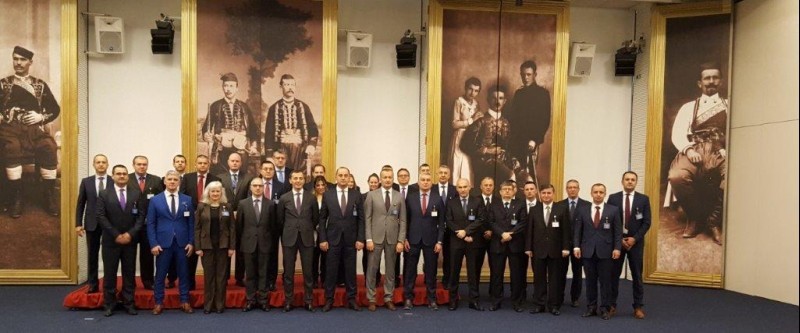- Home/
- News
South East European Military Intelligence Chiefs adopt OSINT assessment on Use of Social Media by Violent Extremists

South East European Military Intelligence Chiefs (SEEMIC) at their 9th Conference held on 7 November 2017 in Budva, Montenegro. (Photo: RCC/Natasa Mitrovic)
Budva – Open-source intelligence (OSINT) assessment dedicated to ‘Use of Social Media by violent extremists' has been adopted by the South East European Military Intelligence Chiefs (SEEMIC) at their 9th Conference held on 7 November 2017 in Budva, Montenegro. The event was co-organised by the Regional Cooperation Council (RCC) and the Department for Military Intelligence and Security Affairs (DMISA) of the Ministry of Defence of Montenegro.
Social media, being the most frequently used mean of communication of the modern world, especially by young people, witnesses numerous attempts of the misuse or abuse by violent extremists and other radical groups, promoting violence, hatred and intolerance. The assessment finds that the use (abuse) of social networks was – and still is – a very important vehicle of dissemination of violent extremist ideas in SEE. Through the content in local languages and often written by people from Western Balkans, this propaganda was very aggressive and often, unfortunately, effective.
Goran Svilanovic, RCC Secretary General addressed the Conference underlining its significant role in building mutual trust but also being a framework for regional and bilateral dialogue between the military intelligence services in South East Europe. Svilanovic added that “it was no coincidence that the topic of this year’s OSINT Assessment is Prevention/Countering Violent Extremism-related (P/CVE) use of social networks by violent extremists, as it was a key aspect of this contemporary security challenge that was chosen as a part of efforts on mainstreaming P/CVE work in all RCC activities in the field of the Rule of law and security cooperation, since we believe that all that we do in the area should be mutually-reinforcing.”
He further mentioned few forthcoming RCC activities related to the topic of violent extremism: a project with DCAF Ljubljana as leading partner, with UNDP and IOM, funded by the EU, dealing with prevention and countering violent extremism in the Western Balkans; RCC-commissioned study on “Rehabilitation and reintegration of former terrorists and violent extremists in South East Europe”, conducted by leading regional experts for the topic, which is in its final stage and will be presented at the regional expert workshop on “Prosecution, Detention, Rehabilitation and Reintegration of Returning Foreign Terrorist Fighters” on 28 November 2017 in Rakitje, Croatia; and the most importantly 2nd Regional Coordination Conference on Counter-Terrorism, Prevention and Countering Violent Extremism in SEE, organized by RCC together with the Slovenian Chairmanship-in-Office of SEECP, on 30 November in Brdo pri Kranju in Slovenia.
The OSINT assessment on the use of social media by violent extremists was discussed earlier this year the SEEMIC Expert Working Group in Podgorica, following the decision to devote OSINT to this topic, from the last SEEMIC main conference held in Moldova.
The event gathered military intelligence professionals to discuss the security situation in the region focusing on the most contemporary challenges, with special focus on terrorism and violent extremism. SEEMIC is a regional initiative assembling South East Europe Military Intelligence Chiefs and it is led and co-chaired by the RCC with an annual host rotation, Montenegro being the 2017’s host. Albania volunteered to host the next, 2018 SEEMIC.


 Development of specialized PCVE web site is funded by EU FUNDS CN 2017-386/831 - "IPA II 2016 Regional Action on P/CVE in the Western Balkans"
Development of specialized PCVE web site is funded by EU FUNDS CN 2017-386/831 - "IPA II 2016 Regional Action on P/CVE in the Western Balkans"